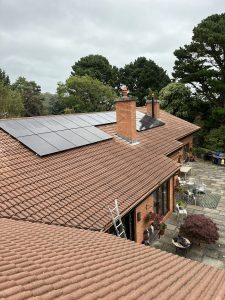Have you ever wondered how solar panels convert sunlight into electricity?
With the growing interest in renewable energy sources worldwide, solar panels are becoming a common sight on rooftops across the globe. This simple guide will explain the science behind solar panels, how they work, and why they’re an efficient choice for your energy needs.
The Basics of Solar Energy Solar panels, or photovoltaics (PV), are devices that convert light from the sun into electrical energy. This process is known as the photovoltaic effect, an essential concept in solar energy production. Solar panels are comprised of many solar cells made of silicon, which acts as a semiconductor.
How Solar Panels Generate Electricity When sunlight hits a solar panel, the solar cells absorb the light and generate direct current (DC) electricity. This occurs because the absorbed sunlight causes electrons in the silicon cells to become excited and move freely. These free electrons flow through the cell, generating DC electricity.
From Sunlight to Household Power However, the DC electricity produced by solar panels isn’t directly usable by most home appliances, which operate on alternating current (AC). This is where an inverter comes into play. The inverter converts the DC electricity into AC electricity, making it suitable for household use. Once converted, this electricity powers your home, and any excess can be fed back into the power grid or stored in battery systems for later use.
The Efficiency of Solar Panels Solar panel efficiency is determined by the amount of sunlight converted into usable electricity. Modern solar panels typically have an efficiency between 15% and 20%, influenced by factors such as the type of material used in the solar cells, the panel’s orientation, and the presence of shade. Advances in technology are continuously improving these efficiency rates, making solar energy an increasingly viable option for more homes and businesses.
The Benefits of Solar Energy Solar panels offer numerous benefits, including reduced electricity bills, lower carbon footprints, and less dependence on the traditional power grid. They are a sustainable and renewable energy source that can produce electricity for 25 years or more with minimal maintenance.
Understanding how solar panels work illuminates the potential of solar energy as a key player in the global shift towards renewable energy. By converting sunlight into electricity, solar panels provide a clean, green, and efficient energy source. Whether you’re looking to reduce your energy costs, decrease your environmental impact, or simply become more energy independent, solar panels offer a compelling solution.
Final Thoughts As we continue to explore and expand the use of renewable energy, the role of solar panels in our energy systems will only grow. With their ability to harness the power of the sun, solar panels not only work to power our homes but also work towards a sustainable future for our planet.



